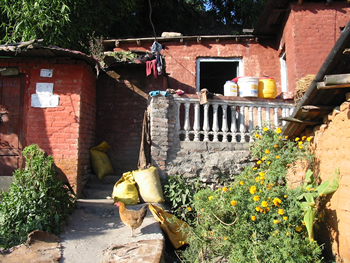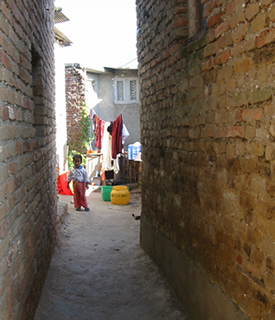
|
|
Technology and Culture in Nepal
 Nepal I spent the month of November 2004 in Nepal doing technology assessment and planning, and I'm scheduled to go back in late summer, 2005. Working with the non-governmental organization (NGO) Lumanti: Support Group for Shelter in the Kathmandu Valley, I'm exploring ways database technology can help with data analysis, report generation for their donor agencies, and policy and decision support. This is a story about cross-cultural technology development. When I got off the plane in Kathmandu, I told Lajana Manandhar, the director of Lumanti, that I just wanted to get my bearings for a few hours, head to my lodgings, maybe sleep off some jet lag. "I have a full programme for you today," Lajana informed me when we stowed my bags in her car.  The inhabitants of this squatter community, “Creation Community” in Kathmandu have settled in for the long haul, with brick buildings and gardens, with Lumanti's help. We went from the airport to the Lumanti offices, where I took off my shoes and sat on the floor for a welcoming ceremony. "Okay," I told Lajana. "Think of me as a clueless but willing eight-year-old girl. You just have to tell me what to do." They sprinkled water over my hands. They gave me foods to eat, strong liquour to drink, stuck a red glob on my forehead, and bestowed a white silk scarf and a garland of marigolds upon me. It took me two weeks to get an overview of Lumanti's entire organization. I made the rounds, trying to touch base with everyone who could speak English. This is a world that turns on relationships, so what really matters for a foreigner like me is to establish personal connections with as many people as possible. I didn't try to make appointments. I figured out early on that they don't function out of appointment books, memos, staff notices. They have a staff mail cubbyhole system that, as far as I could tell, is completely ignored. Paper, as a communications tool, isn't part of their modus operandi. This is an almost entirely verbal business culture. People sit together and discuss everything. They meet with their counterpart NGOs and donor agency people and talk everything out. Nobody likes writing reports. At the end of two weeks, I was ready to present my preliminary findings to the group. Lumanti has computers, a laptop, and an LCD projector. They're adept at using PowerPoint. But they're unfamiliar with databases and they've asked us to design, build, and teach them to use one. I talked about the theory of database technology. It's like this cube of information, I told them, and you can look at it from any of its many sides, making a square appear between my hands, turning it this way and that. "Can I do this?" somebody asked. With the click of a mouse, I told him. "And that?" Yep. Since they operated on a verbal not printed level, made decisions verbally, solved problems by talking, and did almost everything through conversation, no wonder their monthly reports were driving them nuts. It wasn't their way of working. Heads nodded enthusiastically. Yep. I had seen them as they see themselves. It was a success.  The families who live in the "Creation Community" in Kathmandu are proud of their garbage-free lanes. Lumanti paved streets and put in under-ground drains here. All through the month, Lajana sent me out into the field. We drove out to Tokha, a small town about a half-hour from Kathmandu's last sprawl, the "before" scene. I went to a successful squatter community and attended a meeting between townspeople and a group of journalists and other NGO bigwigs. I sat in on a tense meeting with some evicted squatters who stand to be the inhabitants of Lumanti's first housing project and wanted to be sure the housing they were getting was going to be acceptable. We walked through a low-caste neighborhood in Patan, where Lumanti had paved streets, streets now free of garbage and stench. I went to a meeting with Lumanti's health coordinator and the city officials in Bhaktapur planning a big Health and Sanitation Fair. I sat in on a child/youth network meeting on International Child Day. I spent a Saturday morning at a meeting of one of the three savings/credit cooperatives Lumanti has helped start. Three hundred and fifty women in a huge university meeting hall and Lajana pushed me to get up in front of the whole meeting and make a speech. I told them America's poor could learn from their courage and resourcefulness. Part of me felt that my job was gathering information for the database. What was I doing, gallivanting around the valley? I enjoyed my field trips, but did I really need them? Once more, Lajana was right. No matter how many interviews I conducted, how many computer and paper files I collected, it was seeing the streets, the houses and the faces of the poor that Lumanti has helped that taught, inspired and changed me. I knew that going to Nepal for a month was more about what they were going to teach me than what I was going to teach them. In fact, I did get a small database built. The Squatter Federation, the association of people living illegally on land they don't own, is trying to extend its base into the troubled Nepalese countryside. They sent researchers out into 22 squatter neighborhoods in a district outside the Kathmandu Valley with a simple questionnaire. They asked about population, household size, kids in school, water sources, toilets, jobs, health issues, and other community problems. I took those questionnaires and created a database, with a form for easily entering the information on the questionnaires. One morning, after I'd given Mahendra, Lumanti's second-in-command, a tour of his new database, he started happily listing the reports he'd like to see. "List of communities, with ward numbers, date established. Chart with districts migrated from. Total population with a pie chart showing men, women, girls and boys. Pie chart with percentages of ethnic groups. Total households with percentages of private toilets and water sources." As satisfying as that small database was, the big job was collecting information about how the larger organization functions so I could help them with those infernal monthly reports. What information is each sector responsible for? No matter whom I was interviewing, interruptions and diversions were the rule. People, I observed again and again, are more important than data. "We'll have a general staff meeting on Friday and hammer the rest of it out," she declared. Of course. Why hadn't I thought of that? This is a country where everyone comes, sits in a circle, and talks. That's exactly how we'd get our information for the Lumanti Information Management System.
That meeting was a kind of blueprint for how things work in Nepal in general and Lumanti in particular. The meeting was scheduled for "first hour," which could mean 10:00 a.m. but never quite does. Instead it means "when everyone gets there, when the slide projector is set up, when we've all had our first cup of tea." In fact, I spent the first two hours of the morning showing Mahendra his new database, taking notes on the reports he wanted. The projector cable needed replacing. Benita, the office girl, called the computer guys across the street and they eventually arrived with shoulder bags and solutions. Lajana had to go to the bank and run a couple of other errands, so we started this meeting without her. The micro-finance guy was busy with his savings/credit cooperatives people who were planning a huge general meeting in early December. People came and went as the meeting progressed. Side conversations were the rule rather than the exception. We were slogging through English/Nepali translations, the clock ticking inexorably towards lunch time, when Lajana jumped up, grabbed the marker and galvanized everybody. She appointed the water and sewer documentalist secretary and began, rapid-fire, getting everyone's input for the database system. By lunchtime, we had filled in all the blanks, several staffers had reports to print out so we could flesh out the bones, and — voila! —two weeks worth of work in a flurry on a Friday morning. The database I'm designing—which will be critiqued, tested, and installed on my next trip to Nepal in early summer—will store decision-making and policy information, make monthly reports much easier to write, and provide donor agencies with reports that conform to each agency's requirements. Users will log meetings, training sessions, workshops, celebrations and exchange visits. James Windle of Hatfield, UK, a computer systems tester who provides pro bono tech assistance to an AIDS clinic in Africa, had given me two pieces of advice about before I left for Nepal:
James was right on both counts. Taking the portable computer meant that I didn't displace someone sitting at her desk and that I had the capability to demonstrate the power of technology. Creating the small, working, effective demonstration helped push the decision-makers into the critical buy-in so necessary for technology project success. The other key to success, I learned, is living in the end users' world, on their time, at their pace. People, relationships, conversation—these are what make things—even databases—happen at Lumanti in Nepal.
Comments
|
||